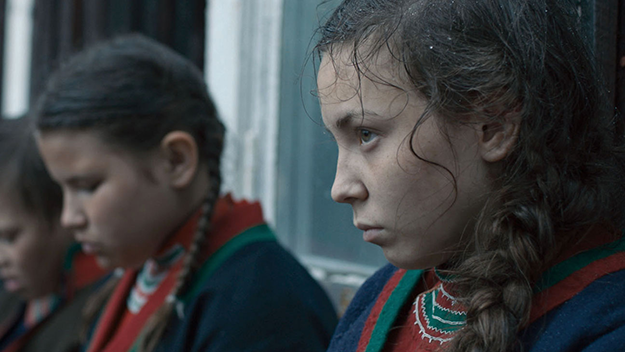Sundance Dispatch
In this week of all weeks, featuring a much-dreaded inauguration and the world-spanning, massively attended anti-Trump women’s protest marches that followed the next day—including a thousands-strong super-snowy one down Park City’s historic Main Street—seeing stories driven by resilient female characters and incredibly talented female directors felt especially vital, and made the process of absorbing film after film in these dismaying, distracting times somehow more palatable, even hopeful. And if the numbers on offer (a total of 80-plus selections written and/or directed by women) aren’t at a record-breaking high, they sure seem to be.

Sami Blood
During the early days of this year’s festival, a pair of female protagonists who are imprisoned, whether literally or metaphorically, made their mark in two fierce, expertly crafted films. Christina, the center of writer-director Amanda Kernell’s feature debut Sami Blood (playing within the Spotlight section, which presents acclaimed titles that have previously premiered at other festivals) is first introduced as an elderly woman returning home to Lapland after a near-lifetime to attend her estranged sister’s funeral. She brings her son and granddaughter along and cannot hide from them her still-present feelings of resistance and from herself, some bubbling-up long-repressed ones of sadness and guilt. But these present-day scenes function primarily as bookends. The majority of the film is told in flashback, set sometime in the 1930s, when Christina, a defiant 14-year-old, does whatever it takes to escape her reindeer-herding family—as well as the limitations, prejudices, and often violent bullying that comes along with this outsider existence of the indigenous Sami people—to go study in Uppsala to become a teacher. Renaming herself from Elle-Marja to sound more properly Swedish, Elle-Marja/Christina is such a fascinating character (with luminous newcomer Lene Cecilia Sparrok’s performance equally captivating)—a flawed, maturing human being, sometimes unafraid to hurt others in her determination—that you might feel a sense of disappointment by film’s end, only because we aren’t offered the details to the in-between years of her life.
In Cate Shortland’s masterful Berlin Syndrome—her follow-up to Somersault (2004) and Lore (2012), both of which also focus on iron-willed yet vulnerable young woman—Clare (Teresa Palmer), a real-estate photographer traveling alone Berlin in search of meaning, finds herself in the harrowing position of losing control of her life when she’s held captive by Andi (Max Riemelt), after spending the night at his apartment. And audiences never fault her for being drawn to him; in fact, it’s the film’s exploration of the male-female sexual dynamic that makes it so complex. The two have undeniable chemistry, and on the surface, Andi is quite the catch. He is insanely good-looking and well-read, and has a stable job teaching English and a close relationship with his father. But, as we learn, he is a very troubled man. Deep-rooted abandonment issues caused by his mother’s walking out on him have made women untrustworthy in his eyes, and instead of facing the risk of ever duplicating those terrible feelings of loss, he holds hostage those he cares about (Clare is not his first prisoner). But while we do get insight into his daily activities, we are on this journey with Clare, trapped indoors in a practically unpopulated neighborhood, as she contends with the idea that the man who once gave her pleasure is now the potential source of serious harm, and forever trying to outsmart him while fighting to keep touch with reality in her new insular existence.

Berlin Syndrome
Just as the unbearably tense climax of the film was about to unfold at the world premiere screening of this World Competition selection, the DCP driver crashed, leaving an audience of more than 500 wringing their hands in anticipation. Shortland, producer Polly Stanford, Palmer, and Riemelt, visibly shaken yet remaining honorably calm, took the stage for a slightly premature Q&A. The actors jokingly offered to act out the remaining unseen minutes of the film before revealing the outcome. Despite now being spoiled, the finale was ultimately shown—and that the majority of the audience was still planted firmly in their seats to see it is a testament to the power of the film.
The North American distribution rights for Berlin Syndrome were snapped up pre-festival and those for Sami Blood just at the onset, so both films will most deservedly have a life outside of Sundance. And these examples of the continued incline of female participation here are indicators of our inching closer to gender equality—at least in the movie universe. Sadly, in real life the struggle has now only become more challenging.







